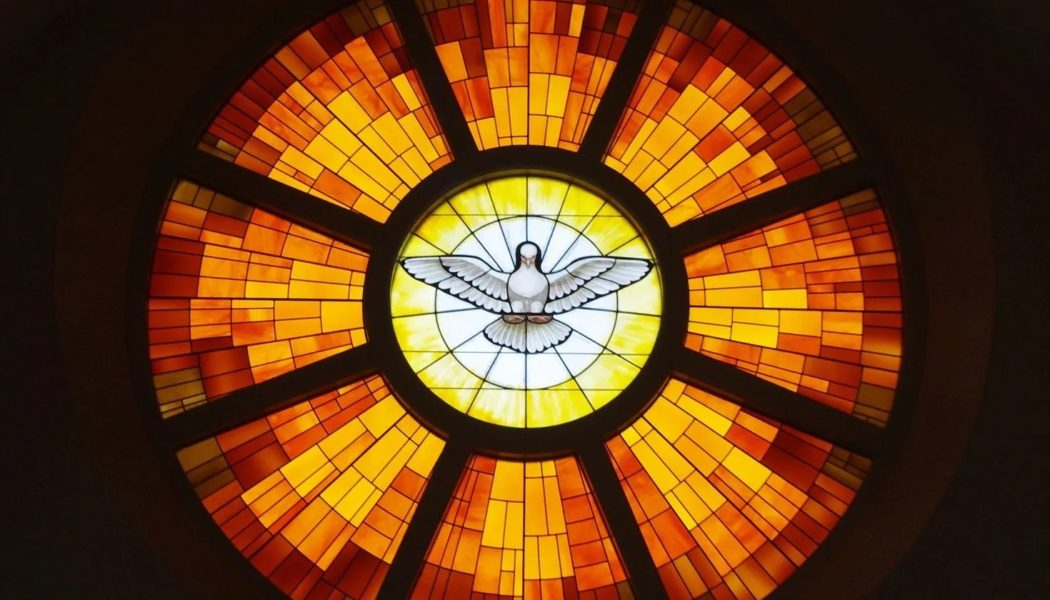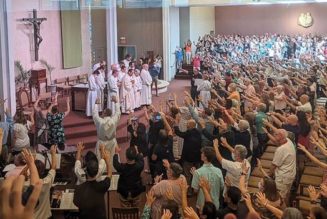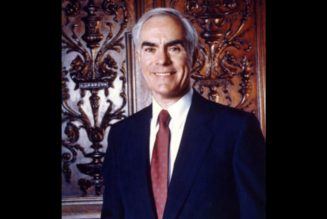
In the Gospel for Pentecost Sunday Year A, Jesus breathes on the Apostles in the upper room and says “receive the Holy Spirit.”
Think of what that means in that room at that time. The last reference the Gospels made to his breath and his spirit was on the cross where, “crying with a loud voice, he said, ‘Father, into thy hands I commit my spirit!’ and having said this he breathed his last.”
Then he died. Everyone knew he died; everyone knew he was buried; everyone knew he failed. He was done.
Yet here he is, back with his apostles, in a glorified body, yes, but a physical body that eats fish and pushes air from lungs in breaths. And instead of committing his spirit to the Father, now he is committing the Holy Spirit to his Apostles.
Jesus Christ and the Holy Spirit did the same thing from the cross and in the resurrection.
When he breathed his last on the cross, dying in our place, Jesus forgave us our sins.
When he breathed on his apostles after the Resurrection, he gave them the ability to extend that forgiveness across time and space down to us today.
“Receive the Holy Spirit,” he said. “Whose sins you forgive are forgiven them, and whose sins you retain are retained.’”
Only God can forgive sins. But now Jesus’s representatives can, too, in his name, because they have the Holy Spirit. That’s what happens when Jesus shares the Holy Spirit with mankind. We are forgiven, remade, renewed — deified.
Fifty days later, at the Jewish Feast of Pentecost, we see how powerful this breath of Jesus is.
It’s as if the breath of the man-God on the Apostles at Easter has grown in strength to a gale as “suddenly there came from the sky a noise like a strong driving wind and it filled the entire house in which they were.”
Then, tongues of fire appear over their heads and they finally get to experience what John the Baptist promised: “I baptize you with water for repentance, but he who is coming after me is mightier than I … He will baptize you with the Holy Spirit and with fire.”
St. John Henry Newman describes how the same thing happened to St. Philip Neri, his spiritual patron. “The Divine presence of the Holy Ghost descended upon him under the appearance of a ball of fire,” he said, “lodging in his breast” and causing palpitations of the heart.
This is a greater degree of the kind of experience the apostles had when they said “Did not our hearts burn within us while he talked to us on the road, while he opened to us the scriptures?”
Cyril of Jerusalem described the Pentecost experience this way: “They partook of fire, not of burning but of saving fire; of fire which consumes the thorns of sins, but gives luster to the soul.”
It is an unmistakable way of showing how closely we commune with God, the “all consuming fire,” who Moses first encountered in fire. It has the same effect on us that it had on the prophet Isaiah, whose mouth was touched by burning coal in a vision.
The first thing the Holy Spirit does is raise the dignity of Christians to prophets.
In one of the Vigil readings for Pentecost, the prophet Joel describes in advance the Pentecost event: “I will pour out my spirit upon all flesh. Your sons and daughters shall prophesy, your old men shall dream dreams, your young men shall see visions; even upon the servants and the handmaids, in those days, I will pour out my spirit.”
This is a portrait of the Church, in which Jesus Christ brings the Holy Spirit and vice versa, turning all of ancient morality on its head. From Pentecost on, instead of there being two kinds of people, highborn and lowborn, the Spirit is poured out on elders and servants alike. Now, instead of there being inequality of the sexes, men and women are equal in dignity as both “sons and daughters” prophesy.
In fact, the readings for the day of Pentecost spread that diversity out even further.
In the First Reading, when Peter, filled with the Holy Spirit, preaches to the crowd, the Spirit facilitates communication between people from far and near, from Asia to Egypt and from Judea to Rome. In the Second Reading, Paul describes how this Spirit stays with us: enabling “different kinds of spiritual gifts,” “different forms of service” and “different workings.” He says: “To each individual the manifestation of the Spirit is given for some benefit.”
If we are all given the prophetic gift, then true diversity is possible in our day: Not just diversity of origin, but diversity of thought.
The Holy Spirit is expressed above all through the Scriptures and magisterium of the Church; but we each have a share in the Spirit.
In the Spirit, everyone’s gifts thrive to their full measso: lovers of silence find peace and calm, lovers of activity find encouragement and vigor. The Spirit fills those dedicates to service and those dedicated to study; it fills the elderly, children, moms and young men. The Spirit will go where he is welcomed and will awaken what’s best in the culture of Ugandans, Norwegians, Vietnamese, Mexicans, Australians, and the French.
Because of the Spirit, the Catholic faith is the faith of the brainy (St. Benedicta of the Cross), the poetic (St. John of the Cross), and the illiterate ( St. André Bessette). The Holy Spirit made our Church the Church of collectors of fine art and collectors of religious kitsch, fans of realism and fans of fairy tales, and those who have no use for any of that.
Conservatives who assent to the magisterium and to Scripture can speak in one way; assenting liberals can speak in another way. Bricklayers and chemists, professors and grocers, bankers and bakers, band leaders and bus drivers — everybody has a share in the Holy Spirit.
But how does this happen?
The Pentecost Sequence we pray at Mass describes how it works.
The prose version of the sequence is far easier to understand than the poetic version. You can find it here. It describes how the Holy Spirit refreshes us like rain, bringing us “relief and consolation,” easing the weary, cooling temptations, refreshing the parched soul, and healing the injured soul. It also sees the Holy Spirit as a light which shines in the hearts of the faithful “even in their darkest corners.”
It’s a beautiful description of the way the Holy Spirit brings grace, in much the same way water and sunlight make a plant grow sturdy. As St. Cyril of Jerusalem put it, “Water comes down from heaven as rain, and although it is always the same in itself, it produces many different effects, one in the palm tree, another in the vine, and so on throughout the whole of creation.”
Grace is like that. It fills us with life so that we can thrive as who we are, where we are, in Jesus. The waters of baptism bring the Spirit to us the first time, and we renew that grace in confession throughout our life, irrigating our soul. Jesus Christ, the word of God made flesh, is sown in our hearts at communion. And the fire of the Holy Spirit, brighter than the sun, brings our gifts to fruition.
And so we pray for a New Pentecost, praying with the Psalm, “Lord, send out your Spirit, and renew the face of the earth.”








